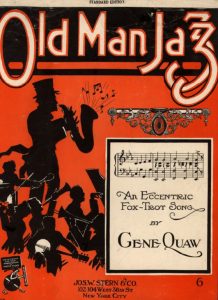 “Old Man Jazz : An Eccentric Fox-Trot Song” written by Gene Quaw hasn’t seen many performances in recent years, and there’s good reason why the first recording that comes up is from 1920. Melodic and rhythmic lines in the opening of the tune veils the main character, Old Man Jazz, in mystery, and the associations and implications of the lyrics throughout the song create a tension between appreciation for Old Man Jazz and the negative aspects to his character.
“Old Man Jazz : An Eccentric Fox-Trot Song” written by Gene Quaw hasn’t seen many performances in recent years, and there’s good reason why the first recording that comes up is from 1920. Melodic and rhythmic lines in the opening of the tune veils the main character, Old Man Jazz, in mystery, and the associations and implications of the lyrics throughout the song create a tension between appreciation for Old Man Jazz and the negative aspects to his character.
The song by Quaw seems to be riddled with messaging that “Old Man Jazz” is strange, in an unknowable, enchanting way. Firstly, the subtitle “An Eccentric Fox Trot” tells us that this is a dance, however, it’s not a typical or conventional dance. The opening introduces our main character, Old Man Jazz, who seemingly “arrives in town” and brings about a performance that causes the townspeople, or presumably dancers, to dance. It’s stated that the people like to dance, as expressed by the lyrics :
“ Old Man Jazz, The music’s great Old Man Jazz, Don’t hesitate, Ev’ry body likes to do the RazzmaTazz”
Even going further as to mention that the townspeople are sad when he leaves :
“Old man Jazz has gone away from town That’s why ev’rybody wears a frown”
It’s clear that this Old Man Jazz has a skill that few others have, an ability to perform jazz, blues, and rag that inspires the people to dance, “shiveree and shake the shimmie”, and “sway like ‘U’ boats”. However, as much as it seems the people enjoy the music that “Old Man Jazz” brings, it’s questionable as to how the music and lyrics paint his character and music. Paralleled to the praise and encouragement for Old Man Jazz, he has a “reputation” that is assumed and isn’t further explained apart from no one caring about his reputation, implying that Old Man Jazz and/or his band have a negative reputation. Moreover, Old Man Jazz is, later in the song, assumed to have left the town with “Mister Booze”, which likely isn’t another character, but an implication that Old Man Jazz left to drink alcohol. The lyrics additionally describe the music Old Man Jazz performs as “wicked” and as “funny blue notes”, pointedly othering the music despite people’s positive reception. These negative implications to Old Man Jazz alongside the praise for this character creates a dichotomy within the music and affects our perception of the music and the character. Should we dance and sing along? Should we feel uneasy? This tension is much like the tension we’ve discussed in class surrounding Black people and Black people’s music throughout history – enslaved people, in books, theater, song and other forms of entertainment, were painted as dangerous, impulsive, or unintelligent but simultaneously were cunning, clever, and skillful; Black spirituals were applauded when they were adopted to be commercialized and suit White audiences and concert performances, but needed to be rationalized as to how Black people and Black culture could have ever come up with this incomparable music that became renowned.
Whether or not Gene Quaw intended to create this dichotomy within his music is not made clear; regardless, whoever “Old Man Jazz” may be, the music outwardly associates jazz, blues, and rag, all significant parts of African American culture and music, with eccentricism and problematic attributes.
For more listening :
“Old Man Jazz” performed by The Elliotts provided by EMGColonel
An actually recent performance of “Old Man Jazz”
